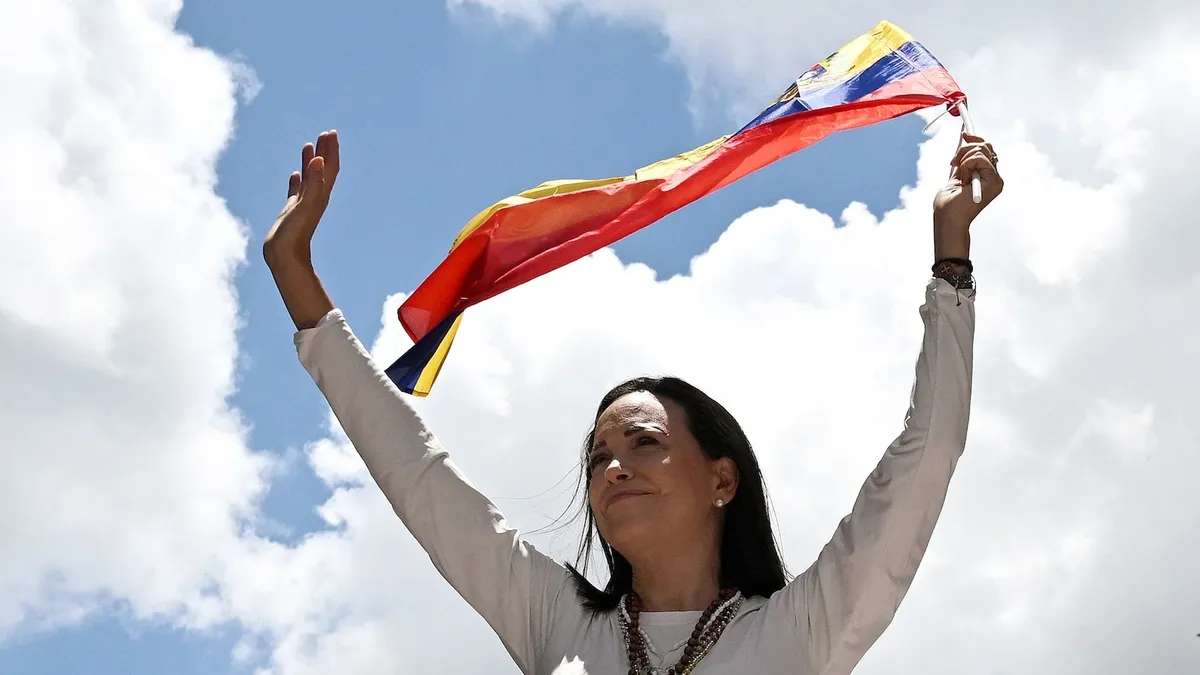
On Friday, the Nobel Peace Prize was awarded to Venezuelan opposition leader Maria Corina Machado in recognition of her relentless efforts to advance democratic rights for the people of Venezuela. The Nobel Committee highlighted Machado's significant role in the ongoing struggle to transition Venezuela from a dictatorship to a democracy.
During the announcement, Jorgen Watne Frydens, the chair of the Nobel Committee, addressed the alarming rise of authoritarian regimes worldwide and the retreat of democracy. He emphasized that democracy, characterized by the right to freely express opinions, vote, and be represented in government, is essential for lasting peace both within nations and internationally. The Nobel Committee recognized Machado as a courageous and dedicated champion of peace, particularly in the face of Venezuela's escalating authoritarianism.
Machado, who is not only a politician but also an industrial engineer, has dedicated her life to advocating for democracy in Venezuela. The Nobel Committee noted her impressive background, which includes a brief career in business and a commitment to social causes. In 1992, she founded the Atenea Foundation, aimed at supporting street children in Caracas. A decade later, she co-founded Súmate, an organization focused on promoting free and fair elections through training and election monitoring.
In 2010, Machado was elected to the Venezuelan National Assembly, achieving a record number of votes. However, her tenure was cut short in 2014 when the regime expelled her from office. Currently, she leads the Vente Venezuela opposition party and played a crucial role in establishing the Soy Venezuela alliance in 2017, which unites various pro-democracy forces in the country.
The announcement of the Nobel Peace Prize was made on Friday morning, but the official award ceremony is scheduled to take place on December 10 in Oslo, Norway. When asked about the implications of former U.S. President Donald Trump's campaign for the prize, Frydens clarified that it did not influence the committee's decision-making process. He emphasized that the committee's focus remains solely on the values and vision outlined by Alfred Nobel.
The Nobel Committee stressed that democracy is a precondition for lasting peace. They pointed out that the Venezuelan regime's oppressive hold on power and the repression of its citizens reflect broader global trends: the abuse of the rule of law, silencing of free media, and the imprisonment of critics. The committee acknowledged that while more elections are being held globally, the integrity of these elections is increasingly compromised, with fewer being free and fair.
Maria Corina Machado exemplifies the three criteria established by Alfred Nobel for selecting a Peace Prize laureate. She has united the opposition in Venezuela, opposed the militarization of society, and remained steadfast in supporting a peaceful transition to democracy. The committee highlighted that Machado embodies hope for a brighter future where citizens' fundamental rights are protected and their voices are heard, enabling them to live in peace.
Last year, the Nobel Peace Prize was awarded to Nihon Hidankyo, a Japanese anti-nuclear weapons group, for their efforts toward nuclear disarmament. The committee noted the unique testimony of the Hibakusha, survivors of the Hiroshima and Nagasaki bombings, as a powerful force in generating global opposition to nuclear weapons.
For the 2025 Nobel Peace Prize, there were 338 candidates nominated, including 244 individuals and 94 organizations, marking a significant increase from the previous year. The record for the highest number of nominees occurred in 2016, with 376 candidates. According to the statutes of the Nobel Foundation, the list of nominees will be disclosed 50 years after the prize is awarded.